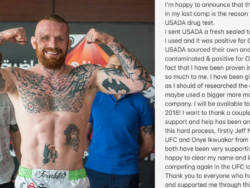The trouble with Ostarine: Jimmy Wallhead’s
16th March 2018
Features


The Bulgarian swimming federation (Българска федерация плувни спортове) claims to have cleared its name, after three young swimmers returned adverse analytical findings (AAF) for stanozolol at a February training camp. Zdravko Bablakov (Здравко Баблаков), Svetlozar Nikolov (Светлозар Николов), and Blagoy Panayotov (Благой Панайотов) were provisionally suspended on 23 February. All three reported an AAF for stanozolol as a result of an out of competition (OOC) test conducted on 4 February, and blamed pills given to them by the national team doctor at a training camp at the Belmeken Sports Complex in the Rila Mountains – part of the country’s National Sports Base.
Georgi Avramchev (Георги Аврамчев – pictured), President of the swimming federation, told a press conference that an Austrian Laboratory had tested the supplements and reported that they didn’t contain any prohibited supplements. However, he also revealed that the Study by the Laboratory was part of an internal investigation commissioned by the swimming federation. As previously reported, this involved the swimming federation giving the supplements to Bulgaria’s anti-doping agency (BADC) for analysis.
“There are no banned substances in the supplements”, he said at a press conference, reports the Bulgarian news agency (БТА). “Doping tests on all athletes from the national teams report a negative result. Over 200 doping tests have been conducted over the past two years, all of which have been negative.
“The Bulgarian swimming federation has cleared its name and we are no longer a party in this case. This does not mean that we will not fully cooperate with the three who are accused of doping. Prohibited substances have never been given to our athletes. Our internal investigation didn’t reveal how the banned substances got into the samples of the three athletes.”
Dr. Lubomir Petrov (Любомир Петров), the Doctor who allegedly gave the pills to the trio, is a Professor at Bulgaria’s national sports academy. He is a member of the Department of Physiology & Biochemistry and the Faculty of Sports, which deals with young athletes competing in a variety of sports including wrestling, judo, ice sports, football, tennis, weightlifting, boxing, and fencing.
After the AAFs were announced, Bulgaria’s ministry of sport (MPES) issued a statement in support of the swimming federation. It asked the swimming federation – and not the country’s anti-doping agency – to conduct an investigation.
‘From 2018 until now, the percentage of positive samples from national swimmers is extremely small’, read a 23 February statement. ‘For this period, the anti-doping agency has conducted 136 tests, of which the total number of positive samples is five, and three are swimmers from our representative teams. This shows that there are no systemic anti-doping rule violations and there is no established practice for the use of banned substances in the national swimming team. The MPES insists that the Bulgarian swimming federation conduct a thorough investigation of the case and that the perpetrators bear the appropriate penalties.’
Bulgarian swimmers Ekaterina Avramova (Екатерина Аврамова) and Diana Petkova (Диана Петкова) have alleged that they were also given pills at national training camps in a similar manner. An online petition has been launched in support of the trio.
It is not unusual for athletes to be permitted to carry out testing on supplements in order to defend themselves from doping charges. But this situation involves a national federation defending itself against allegations that it doped athletes. And the pills were given to the athlete by a national sports academy Doctor, who also deals with athletes in a number of other sports.
In such circumstances, it is perhaps unusual for a national federation to be permitted to conduct its own investigation into supplements it gave to athletes. If the national federation was doping its athletes or if a contaminated supplement was at fault, it could withhold that particular substance or supplement from testing, allowing it to exonerate itself.
The World Anti-Doping Agency (WADA) has yet to comment on the situation. It recently confirmed that it is investigating why UK Anti-Doping (UKAD) allowed British Cycling to conduct urine testing on a group of riders at an unaccredited Laboratory in 2011 to rule out innocent explanations for an ‘abnormal’ finding.
• Eleven athletes (and a horse trainer) from eleven countries, competing in nine sports, were...
• 20 athletes from nine countries, competing in ten sports, were involved in anti-doping proceedings...
• Twenty four athletes from 13 countries, competing in eight sports, were involved in anti-doping...